
Passionate Abolitionist and
Witness to the American Civil War


Passionate Abolitionist and
Witness to the American Civil War

This letter was found by the librarians in the small town of Ilkeston, Derbyshire over twenty years after we had first started researching the Thomas Jackson collection! Like his first letter about witnessing a slave market, this letter was published by the Ilkeston Pioneer.
Note that we have filed this letter under the date when it was written (May 17, 1863) although the publication date is obviously later.
It is clear from the editor’s introductory note that the letter had been first sent to Willam Slater, TJ’s English cousin who as a young man had spent a few years living with Thomas Jackson in Reading PA. TJ had repeatedly requested that he would like his letters to be printed in the English newspapers because he felt that if his old countrymen knew the truth of what was happening in America, they would not start to support the southern states even though England was desperate for cotton to keep its garment factories open.
This letter is a raw account containing so many insults and abusive racist remarks against Blacks that it is by far the most extreme depiction of the attitudes of many slave holders that we have encountered in the TJ collection. On the other hand it is full of TJ’s commentary admiring the personal qualities of the slaves and even giving examples of their near saintly behavior. (Eg returning southern black captives to their owners across enemy lines so they would not be accused of dissertation and killed.)
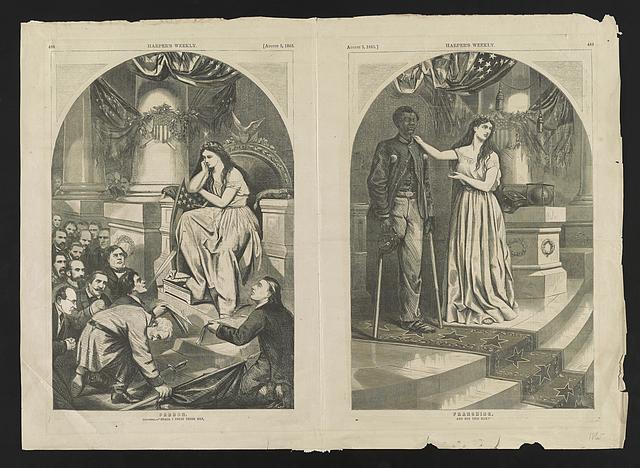
Columbia, the poetic personification of the United States in 1860s is seen questioning “Shall I trust these men, and not this man?” when judging whether she should pardon Confederate troops who are begging for forgiveness when an African American Union soldier with an amputated leg does not have the right to vote.
Source: Library of Congress. 1865. Reproduction # LC-DIG-ds-07129
The TJ Ambassador feels that this sentiment would be heartily supported by Thomas Jackson as he wrote this letter.
In this letter, TJ reports examples of actions on the part of Southerners that are chilling in their barbarism- eg agreeing that black soldiers from the Federal army be allowed to collect dead and wounded colleagues from the battle fields under a flag of truce and then when that been done, changing their stance and killing them all.
This letter is the most fervent example of Thomas Jackson’s support for freeing the slaves and allowing them to fight on behalf of their race (A role that was rarely granted to them because of the hatred that was expressed by many Northerners.)
At the same time TJ quotes many examples of the cowardice and failings of members of the northern forces.
This letter shows the extreme of Thomas Jackson’s respect and trust in members of the black race that made up the slaves, both captive and freed.

Motto of 24th Regiment US Colored Troops. Let soldiers in war Be citizens in Peace
Source : Library of Congress Prints and Photos Division : Reproduction Number: LC-DIG-ppmsca-11274
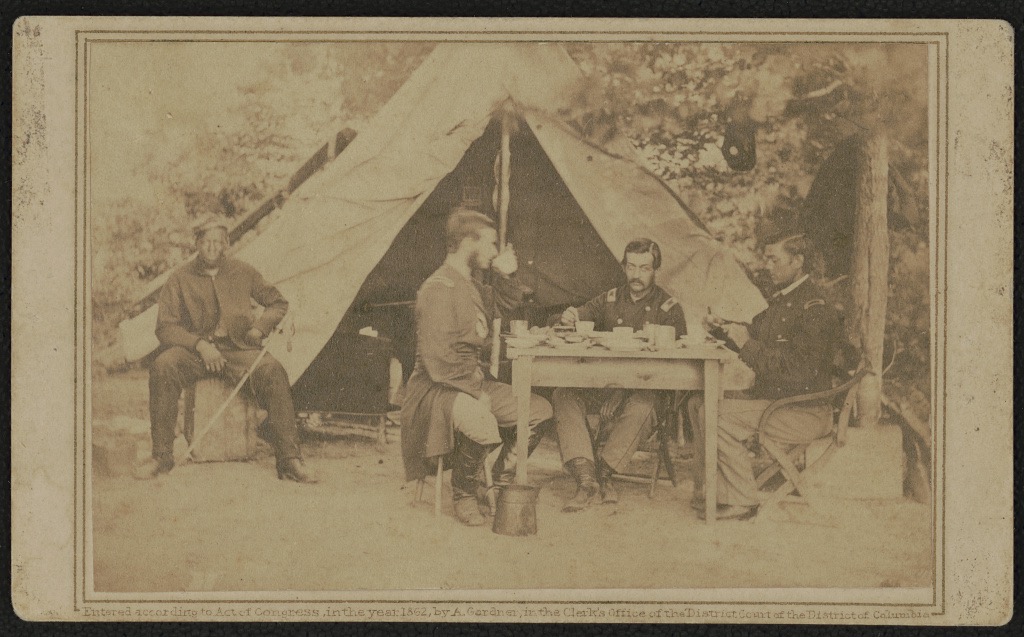
TJ felt that the leadership of the federal forces was wrong in denying many African Americans the opportunities to be soldiers and fight those who represented slave holding in the south. Instead of welcoming the support of African American men, most who tried volunteer were turned away while others were allowed to join but were used to provide purely menial services for white officers
Three soldiers eating at a table while an African American soldier seemingly a servant sits separately with a sword on his knee.
Source: Library of Congress Manuascipts and Photos; Reproduction Number LC-DIG-ppmsca-57819
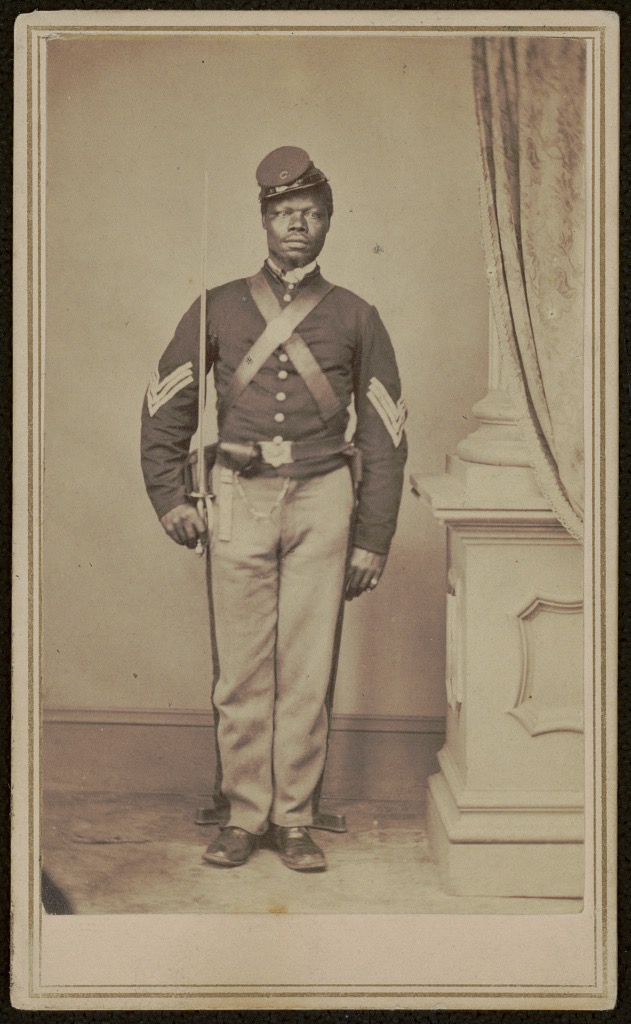
In contrast to the subservient involvement that some had to tolerate, there were many examples of soldiers who were fiercely proud to serve their country in large part because they saw their involvement as a chance to fight against the forces of slavery.
Sergeant Charles English of 108th Colored Troops Infantry Regiment in full uniform demonstrating his pride and commitment to serve the northern forces.
Source: The Library of Congress Manuscripts and Photos. Reproduction Number :LC-DIG-ppmsca- 72053.
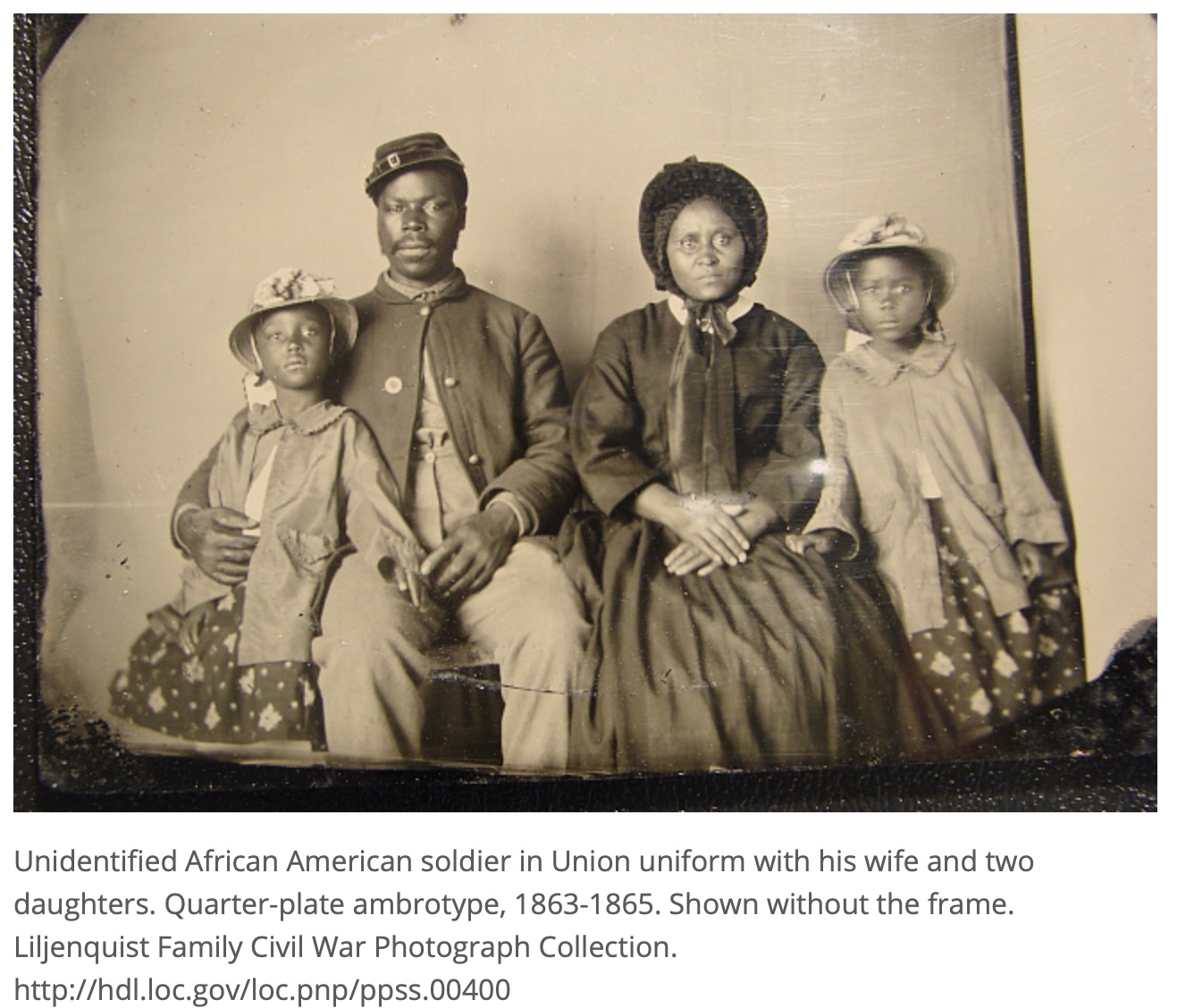
Soldier in Union uniform, wife in dress and hat, and two daughters wearing matching coats and hats.
This image was found in Cecil County, Maryland, making it likely that this soldier was attached to one of the seven U.S.C.T. regiments raised in Maryland.
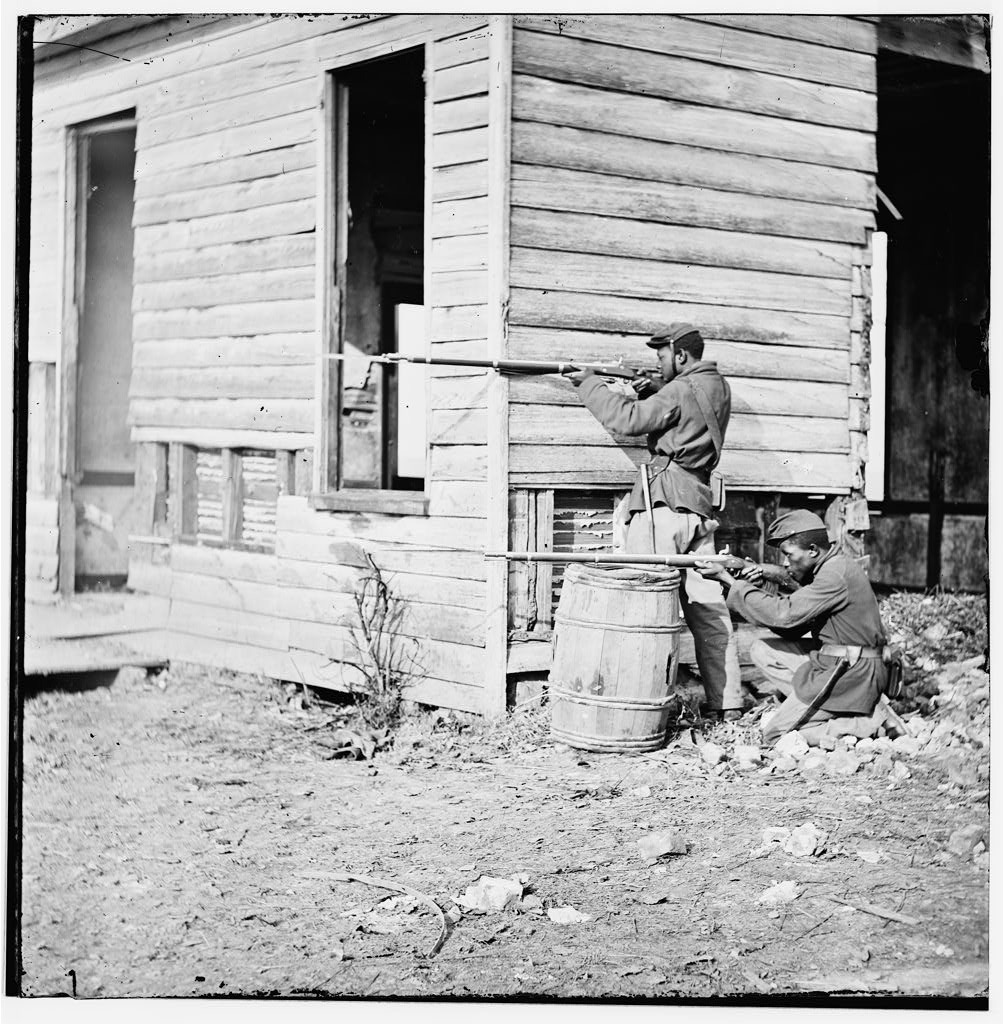
Picket station of colored troops near Dutch Gap, VA
Source: Library of Congress prints and Photos: Reproduction Number LC-DIG-cwpb-01930
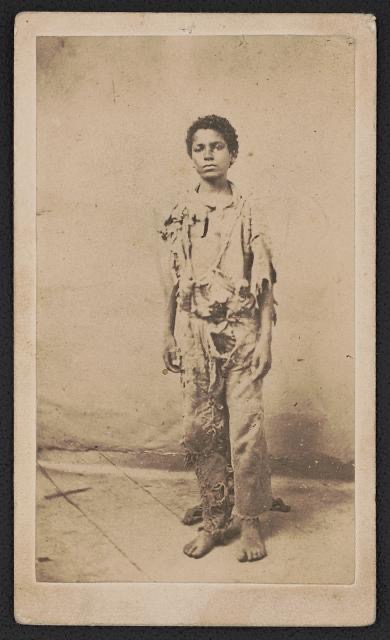
Taylor prior to joining 78th Colored Troops infantry as a young drummer boy.
Source: Library of Congress Manuscripts and Photos Reproduction # LC-DIG-ppmsa-52168
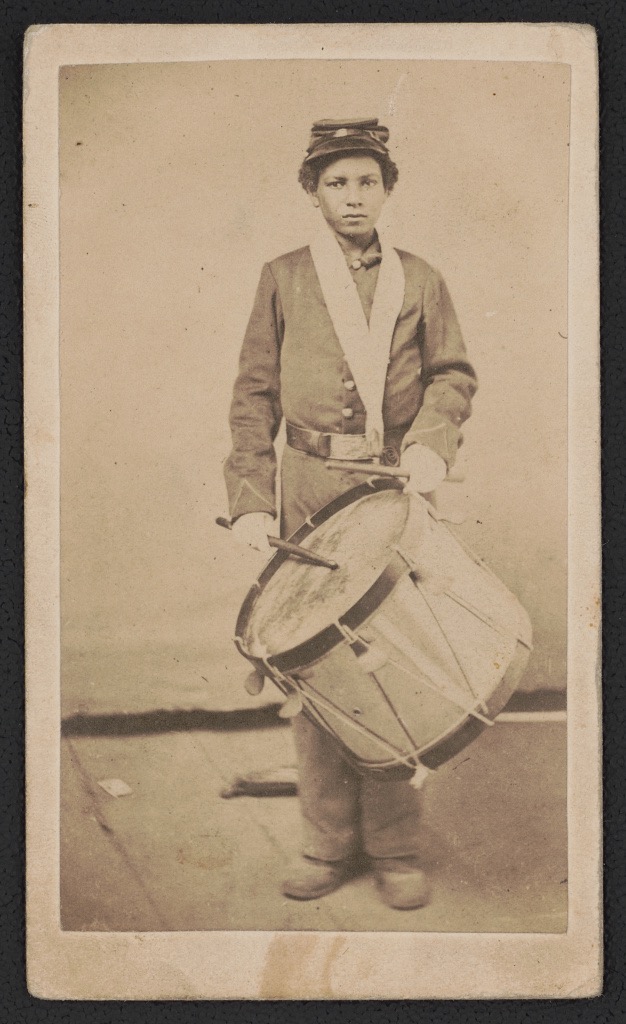
Taylor in uniform with his drum
Source: Library of Congress Manuscripts a d Photos Reproduction Number LC-DIG-ppmsca-52169
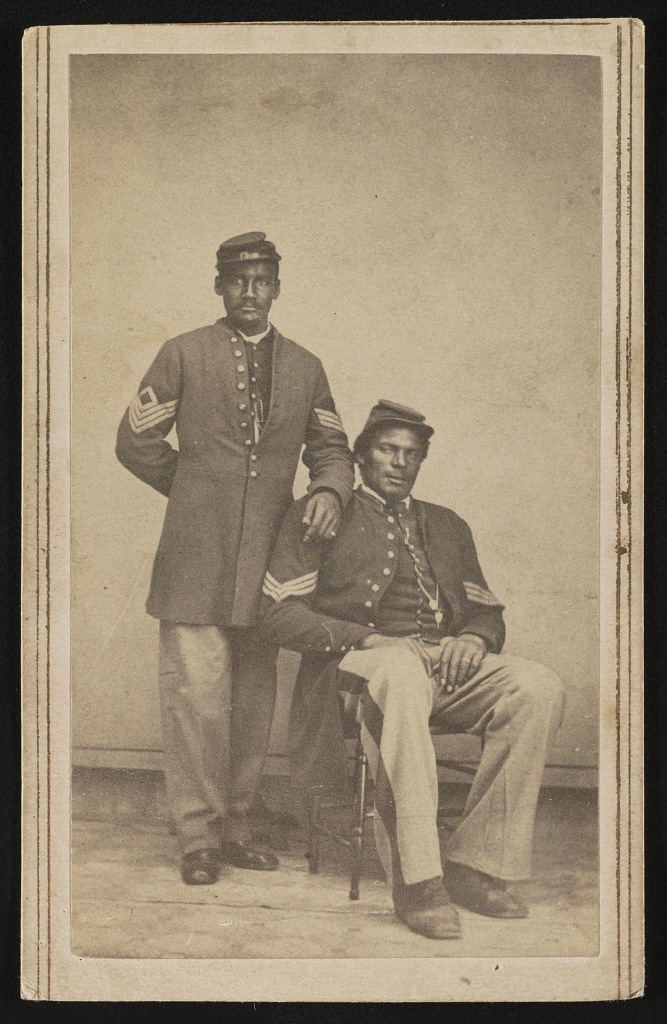
Self respect and personal confidence are reflected by these two African American sergeants in Union uniforms
Source: Library of Congress division of Manuscripts and Photos – Reproduction Number LC-DIG-ppmsca-41852
Ambassador’s Note: Important Disclaimer Visitors should be aware that this letter contains highly offensive, racist language Including the frequent use of the N-word which is quoted by the author as expressing the common attitudes of those who sympathized with the institution of slavery in 1860s.
It may help the reader keep perspective in this long letter if we advise that the following themes are included: Why the War has gone on so long - Slavery rebelled Against Liberty Much abuse and disrespect of Black contrabands - Faced rebels in the South, racial bigotry in the North. Black volunteers were rarely given an opportunity to fight against the confederate forces. Southern Blacks who ran to Union Army were repelled by bayonets. Many northern generals were politicians looking for personal advantage and were willing to drag the war out until the next election when their own party might get into power. Many northern businesses thrived as a result of the war and finally the mood was ripe to beat the rebels.
AN ILKESTONIAN IN NORTH AMERICA
—
HIS OPINIONS on the WAR & SLAVERY
An introduction from the Editor of the English Ilkeston Pioneer Newspaper
Believing, as we do, that the following interesting letter very correctly represents the state of parties and public opinion in the Northern States of America, in reference to the war and slavery, and that the writer is well-known to many of our readers in the Erewash Valley, we have great pleasure in presenting it in extenso. It was addressed to Mr. William Slater, of Eastwood, (a cousin of Mr. Jackson,) who has kindly placed it at our service. We shall be very glad to hear from Mr. Jackson again, particularly if in his next letter he should have to comment on the close of the war.
Dear Cousin, – I received your kind letter of the 17th March, and also the newspaper. If my letters afford anything interesting to my native countrymen I shall willingly give them all the information on American affairs I can. But they must please to take my letters just as they are first written, and excuse ungrammatical errors, or absence of elegant language, for I have not time to re-write and correct them.
You seem to think this war lasts too long, and that the Northerners ought to have beat the rebels before now. So they could, and so they might have done, if they had made war on the rebellion as any common-sense man, or any liberty-loving people would have done under the same circumstances. I had been in America over 30 years when this rebellion broke out, and thought that I understood something of what I called the practical common-sense character of the people of the free states. But I find that I was entirely unaware of the darkest feature in Northern politics – the extent of the strong pro-slaveryism of the people of the free states.
This is a rebellion of the rich landholders and slaveholders of the South – the aristocracy of the slave states – against the free working man’s vote, legally and constitutionally given at the ballot boxes in the presidential election of 1860. That election was against the further extension of the infernal institution of slavery into the hitherto free territories of the republic. Thereupon the slaveholding aristocracy immediately took up arms to make war on freedom. Slavery rebelled against liberty, to bathe this happy and prosperous land in fraternal blood, rather than have its insolent schemes of aggrandisement at all checked by the Northern free man’s vote. Rather than submit to have the national administration from under their control for one short presidential term of four years, they determined to break up the Government, seize the capital, sunder the nation, and make the 15 slave states a haughty, insolent, defiant, and despotic power, based solely and entirely upon the accursed institution of human slavery, and extend it permanently over the far greatest and finest portion of this vast continent, which we all had thought was dedicated to freedom and consecrated as the land of liberty, the home of the free for ever.
To show you that this view of it is the correct one, I will relate an incident that occurred to me six years ago. In May, 1857, I happened to be on a steamboat on the Delaware river; sitting near me were three very fashionably dressed and aristocratic Southerners. They were talking to a Northern man in a very insolent, arrogant manner. The one next to me, an elderly gentleman, quite grey, dressed in very fashionable black, with a white cravat and clerical appearance, mentioned Brookes’ attack on Mr Sumner in the United States senate chamber. He approved it, and said he should have killed Sumner. Sumner was the senator from Massachusetts, and had made an unanswerable speech against slavery, and Brookes beat him about the head with a cudgel as he sat in his seat in the senate for it. Disgraceful, villianous and brutal as that outrage upon free speech and the dignity of the United States senate was, all parties in the slave states, and most of the Democrats in the free states applauded it, and this hoary headed manstealer wished he had murdered Sumner, simply because they could not refute nor gainsay the truths he had proclaimed in the national council chamber. I had been a listener until then; but could not help giving my opinion when I heard that brutal and cowardly attack backed up. So I very quietly said, “Please excuse me, but I must give you Southern gentlemen a little advice.” They all three looked at me with a haughty frown. But I very calmly went on, “As long as this dispute between the North and South is only a war of words, you may talk as fast as we can, but you certainly should be the last to come to blows, for you will get very much the worst of it.” The old clerical-looking Southerner immediately turned on me in the most insolent and arrogant manner, and shaking his finger close to my nose, very fiercely answered, “Sir, we have ruled this country ever since the adoption of the Federal constitution. We mean to rule it on, and if it comes to a fight we will whip you.” I told him I knew the first two of his assertions were true, but he would find that the last was far easier said than done. But this shows the true cause of the war.
The aristocratic slave owner or the bondage-blasted South has rebelled against the national government, the very first time the freemen of the North have fairly won at the ballot box the legal right to influence the national policy in favour of free labour and free soil, and against the unlimited extension of slavery.
Now, under these unmistakeable circumstances, I thought the North would at once consider the rebels as voluntarily breaking the bond, and thus freeing us from all constitutional obligations to respect their peculiar institution; and that to weaken our enemy, and save white men’s lives as much as possible, we should at once proclaim the abolition of slavery, and arm all the blacks on our side that were willing to fight for the freedom of their race. Any common-sense people, similarly situated, who really loved liberty from principle, or even to save themselves from being slaughtered in battle by such an insolent foe, would have instantly adopted that policy, and availed themselves of the powerful aid of the enemy’s bondmen.
Most of us sincerely anti-slavery men did and said all we could in favour of at once arming all the coloured men on our side, and they were then all anxious to enlist. We could have had hundreds of thousands of as good soldiers for this war as ever handled a musket – obedient, hardy, used to the climate, acquainted with the enemy’s country, and who would have fought fully as bravely as any Union soldiers have fought. But no; they were “niggers,” and it was not constitutional to arm niggers, as if the lordly rebels cared anything for the constitution. We showed them that every able-bodied man taken from the enemy and enlisted on our side counted two, as against the foe, one from him and one added to our own number; but it was all in vain. The bullying reply was, “Who is going to fight alongside a dam nigger.” The Democrats cried, “To hell with the niggers.” “They aint human beings anyhow,” says another. “O dam the darkies, they’ve no right to be free any way,” says another. “By Jesus, I aint agoing to fight for the dam’d niggers”, says another [ some text missed], who took good care to stay at home, and not to fight at all. Such was the cry two years ago.
Although the slaveholders had taken up arms against this “free” government that had always protected their so-called constitutional right to hold men and women in the most brutalizing bondage, and sell the wife away from the husband, and the child away from its mother for ever, still the infernal institution of slavery must be held as sacred as the holy of holies. The rebels’ right to his bondmen must be most scrupulously enforced as constitutional, although that rebel was trampling that constitution under his gory feet in the life blood of his slaughtered fellow-citizen. So the war began by the North to preserve the constitution as it is, and restore the Union as it was, meaning with slavery as before, and that is the party cry of the Northern Democrats now. It is the cry on which they expect to elect a Democratic president next year, then coax the rebels back again by laying all the blame on the Abolitionists, proclaiming a full and general amnesty, and shaking hands with these southern traitors over the bloody graves of two hundred thousand Northerners slain in this war, and restore the Union as it was by again giving them the controlling power in the national government, and the right to extend slavery as much as they please. When the Northern army went into Maryland in the spring of 1861, the commander, General Butler, a Boston Democrat, said in his proclamation to the Southerners that he would put down a servile (slave) insurrection as soon, and as willingly, as he would the insurrection against the government. The poor blacks ran to the Union army by hundreds and thousands, but they were repelled, driven back at the point of Union bayonets. Many brought valuable information to Union officers, and were still given back to their rebel masters, who flogged them fearfully. In some instances they were whipped to death for giving warning of danger to Union soldiers, and revealing the secreted arms and stores of the rebels. In many instances Union officers sent back runaway slaves under a guard of Union soldiers over the rebel lines, and returned them to their masters in the rebel army.
When the Union army first advanced into Virginia in July, 1861, the commander issued strict orders to drive all blacks away from the lines, and allow none of them to come into the camps, or communicate with the men under any circumstances whatever. Thus refusing to receive any information of the enemy’s plans and preparations from the only persons willing and able to give correct information, and warn them of the trap laid for them, they marched right into ambuscade at Bull Run, and met with a most disgraceful defeat – a total route. If the rebels had had a Wellington to command them, it would have been a Waterloo annihilation of the Union army, and Washington would have been taken. The rebels used their slaves in this first battle against us. I have conversed with black men who escaped from them, that solemnly assured me they were forced to fight against the Union in the first battle of Bull Run, by being used to work the guns in the masked batteries. The rebel officers stood by with heavy whips, and flogged them if they were not quick enough in spunging out the guns and handing ammunition.
When it was found that the rebels used the slaves against us, our generals pronounced all slaves contraband of war, same as rebel army horses and mules, and received all that came to our lines, but refused to recognise them as men or human beings. Instead of enrolling and arming them, as men so willing and anxious to aid us should have been, they were called contrabands, and used as slaves to do the work or drudgery of our officers, or lay about in idleness. At first our Conservative generals would not use them, even to dig intrenchments or construct redoubts, and thousands of our white soldiers died from fatigue and exposure in unhealthy places, where black men could stand the work and the miasma without getting the fevers so fatal to our men. In the summer of 1862 the good Democratic general, M’Clellan sacrificed fully ten thousand white soldiers to his constitutional conservatism and contempt for niggers, refusing to use them even in the hardest work and most sickly localities, and making white men do it at such a fearful loss of life.
The contrabands, as the poor fugitive negroes are called, have been fearfully abused and maltreated by our men, almost everywhere that they have come in contact with them. Only a few weeks ago I was coming up from Philadelphia in the railway cars. Sitting near me were two soldiers from the Army of the Potomac. One of them, a good Democrat, was abusing the President for issuing the proclamation abolishing slavery in the rebel states, and said it brought the “Dam niggers over to our camps by scores;” but, says he, “we serve ’em out! Four of ’em escaped across the Rappahannock the other night, where I was, and when they came to us there were so dam saucy, we knocked ’em all four on the head and finished ’em.” I asked him how they were saucy. “Oh! they said they were free now, and did not fear anybody,” was the reply. I told him the poor fellows had been slaves all their lives, and might well be overjoyed that they were at last free; and putting implicit faith in the President’s proclamation, issued under the highest authority of the nation, they thought they had found friends, but met their worst foes. “Yes,” says the villain, “we didn’t want any of their dam’d niggers near us, and by Jesus we served ’em right!”
Now, if the Union armies are to go on treating the poor slaves in this manner, do you think it possible for the North to win, if there be a just God above us! The North sacrificed a hundred thousand white men’s lives, and spent a thousand millions of dollars before they would touch slavery at all. President Lincoln publicly declared that if he could restore the Union without freeing a single slave, he would. And when he first proclaimed his threat to free the slaves he gave the rebels 100 days to reflect on it. General Fremont had before proclaimed liberty to the slaves of rebels only in a small part of Missouri, and Lincoln recalled it instantly, dismissed Fremont, and gave him no command since. General Hunter proclaimed liberty only to the slaves of rebels in South Carolina, Georgia, and Florida, and Lincoln instantly recalled it, and Hunter too.
When the President issued his famous first of January proclamation of freedom he was not ashamed to declare that he did it only as a military necessity, and was very careful to exempt all places and districts held by the main force of military power to the merest semblance of a loyalty, very plainly repugnant and loathsome to them in every way. The Legislature of the forced, but still only half loyal State of Kentucky, then in Session, immediately passed a most sweeping and stringent law to enslave all free coloured persons coming into that State. It was openly avowed that the intention of this was to re-enslave all they could catch of those made free by “Lincoln’s abolition proclamation,” and they have re-enslaved, and are re-enslaving, many thousands of the poor fugitives fleeing to fancied freedom, for they escape from the rebel slave-driver only to be captured and enslaved by another calling himself “loyal,” and yet thus insolently defying and defeating the supposed intentions and wishes of our President to give freedom to the slaves of traitors. The western border free States have stringent laws prohibiting all blacks or mulattoes from coming into or settling in them under severe penalties of fine, imprisonment, and expulsion, and they are now being rigidly enforced by the democrats. The democrats have been trying hard to get such a law passed in Pennsylvania, but failed for want of a democratic governor, and majority in the Legislature. But the “conservative” democratic border free State of New Jersey passed a severe and barborous law last winter, after the President’s proclamation was issued, excluding all coloured persons from that State.
After the last battle of Bull Run last summer, when the Union army was most disgracefully defeated and driven from the field, our General asked and obtained permission from the rebels to send for our wounded, still lying where they fell, and to bury our dead. A large force of unarmed men went for the wounded, and also nearly a thousand negroes, under a flag of truce, to dig the graves for the dead. The rebel guards stood quietly around until the negroes had finished their mournful task, and then seized and sent the whole of them south into slavery, laughing at the flag of truce, and neither our generals nor our government thought it worth while even to remonstrate, if ever so meekly. The rebel Congress passed resolutions, and the rebel President issued proclamations, enslaving or putting to death all blacks taken from the Union armies, or from the loyal States, and they have carried them out even so far as murdering many poor blacks taken only as drivers of union wagon trains, and our Government has never retaliated or even remonstrated. Our Congress has at last passed laws to enrol and arm all the black men we can get on our side. And, in every instance yet, where the blacks have had a chance to fight, they have fought fully as well as the whites. The rebels most fiercely threaten death to all black soldiers, and white officers taken with them. Deputations of brave and loyal black men have called on President Lincoln, urging him to declare that black soldiers must be treated as prisoners of war when taken, but he keeps doggedly silent on the subject. Still the negroes are enlisting by tens of thousands, willing to fight for the freedom of their race at any risk. And, should the rebels persist in the murdering of black prisoners, there will be a bloody retaliation whether President Lincoln sanctions it or not. The villianous demagogues who still adhere to what was the Breckinridge, or most ultra pro-slavery wing of the democrats, are doing all they can secretly, and all they dare openly, to divide the North, and organize a peace-at-any-price party, which means peace on any terms, no matter how disgraceful, how humiliating, or how grovelling, on the part of the North, so that it only saves slavery as it was, and restores the Union, with the slave States, on the side of their party. They would accept Jefferson Davis as our President, and put all his Cabinet in power at Washington to-morrow, most gladly if he would put them all into fat offices, and their friends have free trade with the slave States. These villians depend upon two causes for success – the secret aversion of most of the people to the taxes, and conscription necessary to a perseverance in the war; and the open prejudice of all, or nearly all, against the poor negro. In the former case, the old democrat is afraid for his purse, and the young democrat afraid for his skin and bones. In the latter case, the feeling against the poor negro free is very strong – perfectly nauseating. He is then a dirty wool-head, and stinks in their nostrils. But if these same good democrats can enslave him, and own him under the devilish slave laws (which they would re-enact in Pennsylvania to-morrow if they could), then he is “my nigger,” worth one to two thousand dollars, and smells as sweet as “the balm of a thousand flowers.” The poorest whites in the slave States are full as pro-slavery as he that owns hundreds of “niggers”. The poorest of them, so poor as never to be able to buy the tenth share of a negro baby, never while he lives gives up the hope of being some day able to own a slave, and be able to call him “my nigger.” Such is man most generally. Give him the power, and he is by nature a tyrant and a despot, whether it be the one-man power of monarchical Europe, or the million-men power of mob-ruled America. Were the rebels to lay down their arms now, and offer to let bygones be bygones, and come into the Union as they were before, a majority of the Northern people would vote to receive them with open arms, and would, if they could, crush out all anti-slaveryism in the free States to please them, and keep them in good humour when they had got them back. We anti-slavery people would be far worse off than we were before. My friends have often cautioned me, and said to me, “If you take the nigger’s part so much, you will get knocked down, and your buildings burnt one of these days.” But my buildings are insured, and I don’t fear these Northern pro-slavery rowdies.
General Heirstzelman, a German officer, testified under oath before the war committee of Congress, that, at the first battle of Bull Run, he led up four Union regiments, one after the other, to attack a single Alabama rebel regiment, and they all ran at the first fire, although they were “fire Zouaves” from New York and Cincinati. They were splendidly equipped in tight buff gaiters, red bag breeches, embroidered waistcoats, short collarless jackets, showy caps, scarlet sashes, and tassels, and had good arms, but there was no soldier in them. They would have been brave enough at mobbing Northern negroes, and burning their houses over their heads, because they had the impudence to be free; or they would bravely flog a slave to please his master, but they had no courage to fight for their own free Government against that same master. I have heard of captains of companies who, after being engaged in a battle a little while, have found only one-third of their men left. Perhaps three or four of them had been hit by the balls of the enemy, and the rest were sneaked off. I know one captain who, at the battle of Fair Oaks, last summer, stopped the stragglers from his company by watching them (not the enemy), with revolver in hand, and threatening to shoot the first man that sneaked.
At the last battle of Chancellorville, south of the Rappahannock, I am told that officers and men sneaked and shied off in large numbers. General Hooker got all his army safely over the river, and into the rear of the rebel fortifications. He had them fairly before him, on equal ground. He had more men, more guns, more ammunition, and a better appointed army every way, and yet he retreated across the river with heavy loss. He feared to trust his men. Bill Tarbit was in all that affair, and taken prisoner by the rebels, but escaped. He is now home again. An Englishman came with him, who had been in the English army all through the Russian war, and also in the American army for the last nine months. He told me that General Hooker had more men and more guns than he knew what to do with. He said that not one-third of Hooker’s army were engaged at all. That he saw over one hundred of Hooker’s cannon come back that never had been fired off in the fight. He said that in discipline, compared with a European army, the grand army of the Potomac was nothing but a mob. I often read of a “desperate engagement,” and thousands are said to be fighting on each side, until one party “falls back,” with a loss of perhaps a dozen killed and a score or two wounded; and then it winds up with the old phrase, “the enemy’s loss must have been much larger.”
Add to this the fact that most of our “generals” are mere politicians: all jealous of each other’s popularity and chance for the next presidency. Many of them good “democrats,” ready and willing to lose a battle any time to bring odium on the present national administration, drag the war along until the next presidential election, and give their party a good chance to get into power. It is well known that General M’Clellan is a democrat of this sort. He kept the “grand” army all the winter of 1861-2 watching rebel batteries, with wooden guns in them, regular “quakers,” and then did not march to the attack until a week after all the rebels had retreated, and then found the quaker guns more harmless still, for they were entirely unsupported. He then took over one hundred thousand men, with a large park of artillery, gunboats, wagons, &c., r—-d [routed??], and landed at a point eighty miles south of Richmond. The first rebel force he came to was 7,000 men, entrenched at York Town, and he, with over one hundred thousand men, set hard at work to entrench too, and after many days of hard work, and no fighting, the rebels walked off, and the Union army took York Town, after it was “evacuated.” So he crept on; and it took him nearly ninety days to get within fifteen miles of Richmond. By that time the rebels had combined three armies into one, and met the Union Army at the Chichahomeny [Battle of Chickahominy], and beat them back; and then M’Clellan and his army retreated as far in three days as they had advanced in three months, and got round again to their old ground, near the famous Bull Run, in time to be again beaten and driven into Washington. Then the rebel army went into Maryland, and threatened Pennsylvania.
Then came the battle of Antietam, where it is well known that M’Clellan’s army could easy have cut up and captured the whole rebel army; instead of which he gave them twenty-four hours’ armistice, and allowed them to escape across the Potomac, entirely unmolested in their retreat. M’Clellan is well known to be a pro-slavery democrat, who wants the war to drag along until his party can elect him President, and then he hopes to make a peace with the rebels and get them all to join his party, and make it strong enough to re-elect him for a second term, and any one he may name after him who will give good fat offices to him and his friends. There are many other officers in the Union army of the same stripe, and so this war drags on. The men just come home will mostly re-enlist. They swear “Uncle Sam” (meaning the United States) has been feeding and clothing them, and he shall do it again. These men don’t care how long they lay watching masked batteries and maple guns, so that they get paid and well fed and clothed. Their politician officers are the same sort of men. The main mishap at the last battle, at Chancellorville, was caused by Gen. Sigel, a real good German officer and a thorough soldier, having been removed from the command of the 11th Army corps (all good Germans, who would fight), to make room for a politician, who was no soldier, much less a general. When the rebels attacked his division, he was so utterly incapable that the Germans got disgusted, threw down their arms, and would not fight, but retreated pell-mell upon those behind them, causing confusion and disaster to half the Union army. Bill Tarbit, and others who were eye-witnesses, assure me this was the real fact. The suppression of this rebellion could have been taken by contract [“contrast” intended?] at the start, finished before now, and splendid profits made by it, at less than half what it has cost. Supposing this war to go on two years longer? Let them estimate the cost to the United States, then give me half the money, and half the war material now on hand, and I, Thomas Jackson, ropemaker, will take the job; and if I don’t finish it up, drive out or hang Jefferson Davis, and all his crew, and make a magnificent fortune too, they may hang me in some of my own cordage. But I should want every politician and pro-slavery man to stay at home and be entirely mutual [“neutral” intended?]. I would then go to Europe for officers, and to the enemy for men. I would take the slaves for the rank and file, and in six months, I would have two hundred thousand far better soldiers for a Southern campaign than are now fighting on either side. The poor black slave can be made a good soldier; and when fighting for his liberty, and that of his wife and his children and his race, will fight like a tiger to the last. This we know well. Although the blacks know their cruel fate if taken, they are enlisting by thousands. The truth is, they don’t mean to ask any favour from the slave-driver. They go to kill him, not to be taken alive themselves. These are the men to fight our traitors with, and we could have had half a million of them in arms eighteen months ago, if the Government had taken them at first and given them freedom willingly. But even now we come to this policy, like a bull to the stake. Stern necessity forces us to it, and the blacks now have, as it were, to force themselves into the army. It is a bitter pill for Brother Jonathan, after his boasting and his abuse of the “damn nigger”, to think that he must free that same nigger, and ask his aid in saving the Union, or be politically enslaved himself. But so it is.
The war will go on until every slave is free, and every black man, north and south, armed on one side or the other. If we take them cordially, and treat them kindly, we can yet get them all, but the few who may be forced into the rebel ranks, and they will run to us whenever they see anything like a chance to get away. The fierce obstinacy of the traitor man-stealer will ensure freedom to all his victims, because the free States will never submit to a division of the Union on any terms. I could give many good reasons for that opinion, but my letter is too long now.
We have settled down to war as a business: we are bound to follow it up to the last rather than the rebels shall succeed in their barbarous intent. The immense means and material resources of the north have not been at all lessened yet, but vastly increased. Collieries, iron mines, furnaces, forges, rolling mills, cannon foundries, armouries, dock yards, rope walks, and workmen of all kinds are as busy as bees, and doing their best to sustain the war and beat the rebels. The only chance left for slavery is for the slaveholders to lay down their arms and submit now. And, thank God, there is not the least danger of them doing that. The Almighty does not mean them to save their barbarously beloved institution, or they would not be so blind, and hardened, and determined as they are. The fate of the confederacy is sealed now. There was a chance for them while the North was so pro-slavery. But we are all becoming abolitionists now. What a change! It seals the doom of slavery. The slave power has committed suicide by rebellion.
I enclose you some examples of our “currency,” and also a rebel five-dollar bill. You are welcome to them all. The rebel note is not worth a farthing. We are all alive and well, and so are the Watsons. I will write you another long letter, and give you an inside view of our affairs. Please remember me kindly and affectionately to all relations and friends, especially your parents.
Yours affectionately,
THOMAS JACKSON

Ambassadors' Notes are commentaries added by the original founders of the Thomas Jackson letters and are intended to add context to the transcription that proceeds them. Other comments by visitors may have been offered in Recent Research and Commentaries in the seventh panel of the homepage.
SEE BOTTOM OF THIS PAGE FOR MAJOR NEW DEVELOPMENT.
This long letter confirms TJ’s strong support for abolition and the granting of rights and opportunities for black men and their families.
He is also expresses harsh criticism for many of the insults and rejections that black people were subjected to in those times by the Union military and many citizens in the Northern free states.
This was sometimes expressed by the most disgusting and debasing cartoons that we have encountered in searching the Library of Congress records.
However Thomas Jackson’s criticism in this letter was not just directed at the lack of rights and respect for the blacks but also at what he saw as a strategic military failure to use the black man’s offers to fight for his race against the confederates.
Thus TJ relates how thousands of blacks fleeing from their owners – contrabands were repelled when they tried to join or gain protection from the Union troops. He also gives examples of how many northerners despised the idea of fighting alongside the blacks or indeed of fighting for the rights of blacks at all, so low was their opinion of and respect for members of the black race.
And he confesses himself astonished that, after living for 30 years as an active member of an American city, he had not realized how racist and antagonistic such a large part of Northern society was towards “colored” folk.
In contrast he points out that where black “contrabands” had been trained as soldiers and had been allowed to fight, they had showed great success, not just in terms of discipline but also bravery.
A Surpising Discovery
Miles Reding, one of our current “Friends of Thomas Jackson”, was stunned to discover that our extensive Thomas Jackson Letters website already displayed the hand-written original of the last two pages of this published letter! They had been posted as a mystery item represented by two orphaned pages and, on the evidence of what they contained, we had guessed that they were from a letter written in 1864!
We have now moved that part-letter to a fictional date so that it immediately follows this one. We have left the old Ambassador’s notes intact explaining why we had judged it to be from1864.
It is a delight to see TJ’s familiar handwriting expressing his sentiments from this letter. It would appear that William Slater had loaned it io the editor of the newspaper in keeping with TJ’s wishes but that somehow only those last two pages survived to be passed down to our generation.

Motto of 24th Regiment US Colored Troops. Let soldiers in war Be citizens in Peace
Source : Library of Congress Prints and Photos Division : Reproduction Number: LC-DIG-ppmsca-11274

TJ felt that the leadership of the federal forces was wrong in denying many African Americans the opportunities to be soldiers and fight those who represented slave holding in the south. Instead of welcoming the support of African American men, most who tried volunteer were turned away while others were allowed to join but were used to provide purely menial services for white officers
Three soldiers eating at a table while an African American soldier seemingly a servant sits separately with a sword on his knee.
Source: Library of Congress Manuascipts and Photos; Reproduction Number LC-DIG-ppmsca-57819

In contrast to the subservient involvement that some had to tolerate, there were many examples of soldiers who were fiercely proud to serve their country in large part because they saw their involvement as a chance to fight against the forces of slavery.
Sergeant Charles English of 108th Colored Troops Infantry Regiment in full uniform demonstrating his pride and commitment to serve the northern forces.
Source: The Library of Congress Manuscripts and Photos. Reproduction Number :LC-DIG-ppmsca- 72053.

Soldier in Union uniform, wife in dress and hat, and two daughters wearing matching coats and hats.
This image was found in Cecil County, Maryland, making it likely that this soldier was attached to one of the seven U.S.C.T. regiments raised in Maryland.

Picket station of colored troops near Dutch Gap, VA
Source: Library of Congress prints and Photos: Reproduction Number LC-DIG-cwpb-01930

Taylor prior to joining 78th Colored Troops infantry as a young drummer boy.
Source: Library of Congress Manuscripts and Photos Reproduction # LC-DIG-ppmsa-52168

Taylor in uniform with his drum
Source: Library of Congress Manuscripts a d Photos Reproduction Number LC-DIG-ppmsca-52169

Self respect and personal confidence are reflected by these two African American sergeants in Union uniforms
Source: Library of Congress division of Manuscripts and Photos – Reproduction Number LC-DIG-ppmsca-41852